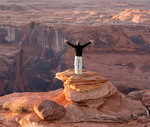The Buddha’s teaching about emotions could be summarized in a single common English phrase, “Feel what you feel.” The technical term, “mindfulness of feeling,” is widely used in Buddhist writing, but I think “Feel what you feel” captures the actual teaching best, particularly because it is phrased in a way that alludes to its opposite, “Avoid feeling what you feel.” We avoid feeling what we feel especially when the feeling is unpleasant, but I would propose that we also don’t actually feel what we feel even if the feeling is pleasant. The basic quality of feeling, pleasant or unpleasant, is … Read More
Author: lewrich
We Age From Our First Breath
 The emotional undertow of aging, I think, is a feeling of loss—Loss of youth, loss of dreams, loss of possibility. This quality is what used to be referred to as mid-life crisis. Other phrases have come into vogue now—such as the cheery “60 is the new 40”—but the undertow of such homilies is still loss. Is there some way out of this sense of loss, some fresh point of view that assuages the pain of it? Actually, there is. Aging is not a matter of years—forty, sixty, eighty—but of life process. Everything is aging, all the time. We age from … Read More
The emotional undertow of aging, I think, is a feeling of loss—Loss of youth, loss of dreams, loss of possibility. This quality is what used to be referred to as mid-life crisis. Other phrases have come into vogue now—such as the cheery “60 is the new 40”—but the undertow of such homilies is still loss. Is there some way out of this sense of loss, some fresh point of view that assuages the pain of it? Actually, there is. Aging is not a matter of years—forty, sixty, eighty—but of life process. Everything is aging, all the time. We age from … Read More
They Are Beautiful and Also They Are Dying
In connection with my new blog theme, “Aging as a Spiritual Practice,” I have been thinking more about this Buddhist term anicca, which is usually translated as “impermanence.” Many of the English terms that we are accustomed to using regarding these basic Buddhist teachings were first coined by 19th century scholars and translators of the Pali Canon. These scholars were very good, and understood the linguistic meaning of the Pali or Sanskrit terms, but they were not practitioners of Buddhism, and did not have oral instruction or a visible living teacher as a model to help them know … Read More
Everything Changes, Everything Ages
I have been thinking for some time about the topic of aging, and how that relates to Buddhism and Buddhist practice. The essence and starting point of all Buddhist teaching is the fact of impermanence, or continuous change. Once Suzuki Roshi was asked to say one thing about Buddhism that was simple and understandable, and he replied, “Everything changes.”
 I think we could also say, “Everything ages.”
I think we could also say, “Everything ages.”
Aging ceases to be an abstraction when it starts to happen to us. It’s like the old Woody Allen joke: “I don’t mind dying, I just don’t want to be there when it … Read More
